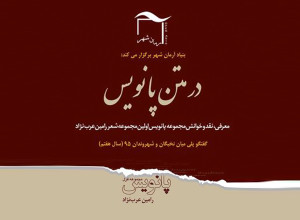“In the context of footnote”, introduction, critique and reading of the first poetry anthology of Ramin Arabnejad, Panevis – footnote – was the topic of the 95th Goftegu debate (7th year), a bridge between the elite and the citizens, of Armanshahr Foundation. It was held in the Herat office of Armanshahr Foundation on 5 November 2012, which more than 40 young poets and cultural activists attended.
The meeting opened with recital of a poem from the anthology by Rashed Ramez, a poet and moderator of the meeting. In his brief introduction about Armanshahr Foundation, he indicated that the foundation had printed more than 100,000 copies of books during its 7-year operation in Kabul and Herat. It has also held meetings on national and international issues in the field of human rights, organised book reading classes, cultural festivals and other meetings. Among them are “Simorgh Critique” meetings, which have been taking place at the Herat office on Mondays in the past 18 months. The meetings are attended by young poets and writers. They begin by screening a short film, which the participants critique. Then, poems are recited and critiqued and various cultural and social issues are discussed.
The 95th Goftegu was concerned with Panevis, which many commentators believe to be one of the important anthologies published in the past few years.At the meeting, Rooholamin Amini (poet and writer), Afsaneh Vahedyar (poet and writer) and Ali Akbar Nazari (poet) read out their critiques of the anthology. They each discussed the poetry of Mr Arabnejad from different angles and its ups and downs. They all were unanimous that the anthology had a simple, fluid and at the same time modern language.
Subsequently, there was free discussion about poetry as well as music in modern and transitional forms of Persian poetry. Proponents of one opinion believed that the music in classical forms creates hurdles for the poet and mesmerises the listener, thus preventing them from focusing on the content. Supporters of a different opinion contended that the most important feature of poetry is its ‘visionary’ aspect; thus, the music in the transitional forms of Persian poetry helps the increasing visionary mental power of the poet and leaves a stronger impact on the audience.
Esmaeil Sarab argued that the traditional forms of Persian poetry are not as flourishing as before and free verse is the predominant form of poetry today. However, Afsaneh Vahedyar and Foroozan Amiri were of the opinion that there has been a return to sonnet in the past few years and this form has a larger audience in comparison with other forms of Persian poetry in Afghanistan.
Invitation to 95th Goftegu Public Debate: In the context of footnote



